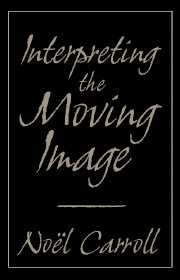Book contents
- Frontmatter
- Contents
- Foreword: Through Carroll's Looking Glass of Criticism
- Introduction
- 1 The Cabinet of Dr. Kracauer
- 2 Entr'acte, Paris and Dada
- 3 The Gold Rush
- 4 Keaton: Film Acting as Action
- 5 Buster Keaton, The General, and Visible Intelligibility
- 6 For God and Country
- 7 Lang, Pabst, and Sound
- 8 Notes on Dreyer's Vampyr
- 9 King Kong: Ape and Essence
- 10 Becky Sharp Takes Over
- 11 Interpreting Citizen Kane
- 12 The Moral Ecology of Melodrama: The Family Plot and Magnificent Obsession
- 13 Mind, Medium, and Metaphor in Harry Smith's Heaven and Earth Magic
- 14 Welles and Kafka
- 15 Nothing But a Man and The Cool World
- 16 Identity and Difference: From Ritual Symbolism to Condensation in Anger's Inauguration of the Pleasure Dome
- 17 Text of Light
- 18 Joan Jonas: Making the Image Visible
- 19 Introduction to Journeys from Berlin/1971
- 20 The Future of Allusion: Hollywood in the Seventies (and Beyond)
- 21 Back to Basics
- 22 Amy Taubin's Bag
- 23 Herzog, Presence, and Paradox
- 24 Film in the Age of Postmodernism
- Notes
- Index
1 - The Cabinet of Dr. Kracauer
Published online by Cambridge University Press: 05 June 2012
- Frontmatter
- Contents
- Foreword: Through Carroll's Looking Glass of Criticism
- Introduction
- 1 The Cabinet of Dr. Kracauer
- 2 Entr'acte, Paris and Dada
- 3 The Gold Rush
- 4 Keaton: Film Acting as Action
- 5 Buster Keaton, The General, and Visible Intelligibility
- 6 For God and Country
- 7 Lang, Pabst, and Sound
- 8 Notes on Dreyer's Vampyr
- 9 King Kong: Ape and Essence
- 10 Becky Sharp Takes Over
- 11 Interpreting Citizen Kane
- 12 The Moral Ecology of Melodrama: The Family Plot and Magnificent Obsession
- 13 Mind, Medium, and Metaphor in Harry Smith's Heaven and Earth Magic
- 14 Welles and Kafka
- 15 Nothing But a Man and The Cool World
- 16 Identity and Difference: From Ritual Symbolism to Condensation in Anger's Inauguration of the Pleasure Dome
- 17 Text of Light
- 18 Joan Jonas: Making the Image Visible
- 19 Introduction to Journeys from Berlin/1971
- 20 The Future of Allusion: Hollywood in the Seventies (and Beyond)
- 21 Back to Basics
- 22 Amy Taubin's Bag
- 23 Herzog, Presence, and Paradox
- 24 Film in the Age of Postmodernism
- Notes
- Index
Summary
Though it would be foolhardy to attempt to trace the development of the early avant-garde the way one sketches the rise of the silent narrative tradition, I think it is at least plausible to assess the importance of The Cabinet of Dr. Caligari for the avant-garde, as comparable to the importance of The Birth of a Nation for the popular film. That is, Caligari is the best remembered early venture in avant-garde film experimentation just as The Birth of a Nation is the most memorable forebear of the commercial narrative. Of course, Caligari was both narrative and commercial, and its influence has never totally disappeared in the popular tradition. Yet it also has special significance for the avant-garde in that it is the most distinguished early attempt to articulate the concerns of a contemporary art movement, Expressionism, in film.
The place of Caligari in film history is secure. It appears wherever the classics are convoked. But its reputation is another matter. Though much seen, it is also much maligned. Two kinds of charges plague it. The first relies on one or another myth of the cinematic. Either Caligari is too theatrical or it violates film's supposed commitment to realism.
The other charge is partly political, but it is also aesthetic since it amounts to the claim that the film is castrated. This argument, enshrined by Siegfried Kracauer, holds that Caligari, though initially a radical denunciation of authoritarianism, was reduced to hollow conformism by the addition of the psychiatric framing story.
- Type
- Chapter
- Information
- Interpreting the Moving Image , pp. 17 - 25Publisher: Cambridge University PressPrint publication year: 1998

